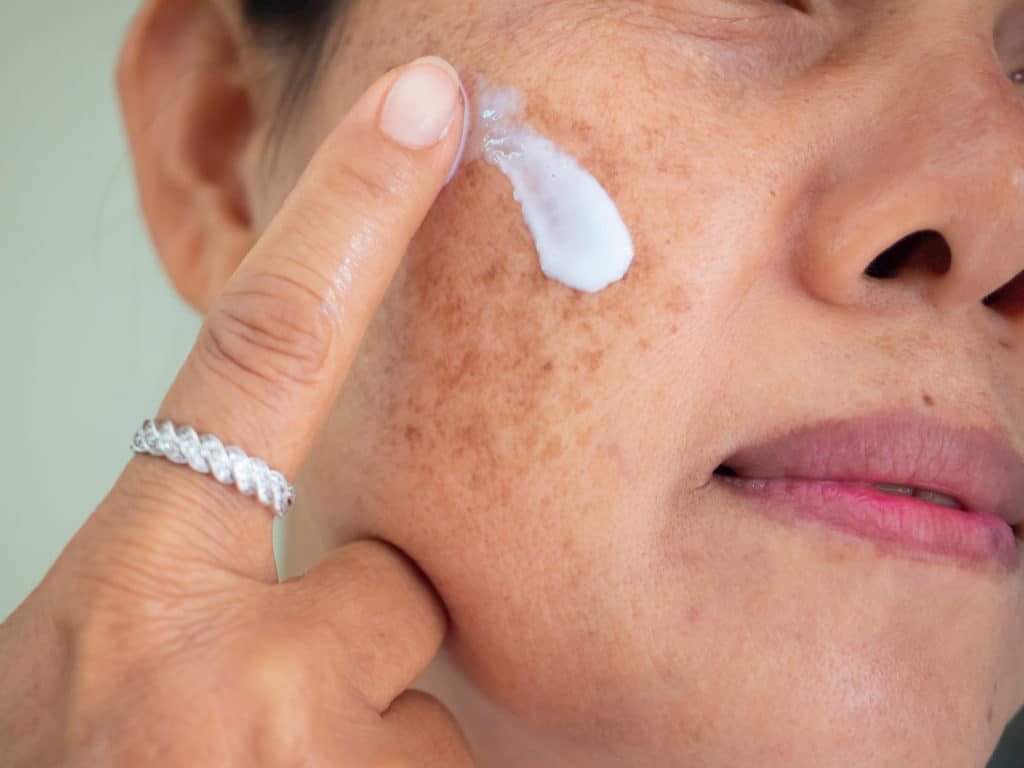Melasma is a medical condition that results in unwanted dark patches typically on the face in young-middle aged adults. Here, we are going to talk about what you need to know about melasma, what causes it, and how it can be treated.
The word melasma is derived from the Latin words “melas” and “soma” which describe a dark-colored spot or patch on the body. It typically is characterized by tan to brown pigmented lesions that occur most commonly on the forehead, cheeks, nose, and upper lip.
Melasma is much more common in women than men, with an estimated prevalence of ~1% in the general population, but as high as 50% in certain ethnic populations among women of reproductive age. The condition affects people of all races and ethnic groups, but it occurs most commonly in patients with darker skin types (especially those of Hispanic and Asian descent).
What Causes Melasma?
There are several factors that may lead to melasma, including:
Family history
People with a family history of melasma have an increased risk of developing it themselves. This indicates that you may have inherited genes that predispose you to develop this condition if you are exposed to sunlight or UV radiation on a regular basis over many years.
Hormonal influences
Certain sex hormones, such as estrogen and progesterone, have been implicated in the development of melasma. It is not exactly clear how these hormones are involved in the development or worsening of this condition, but it is clear that they are related given the increased prevalence of melasma with:
- Pregnancy
- oral contraceptives
- menopausal hormone replacement therapy
- hormonal intrauterine devices and implants
Thyroid disease also appears to be related to melasma, but not as strongly as with the sex hormones listed above.
Medications
Certain medications have been associated with the development and/or worsening of melasma including, but not limited to:
- oral contraceptives
- anti-epileptic medications (ex. Anticonvulsants, phenytoin, carbamazepine)
- anti-malarial medications
Who is more likely to get melasma?
Melasma is a skin condition that usually affects people aged 20-40, but can also occur in older people. Women are more likely to get melasma than men. People who have darker skin tones are also more likely to get melasma, as are those with lighter skin tones who have relatives with the condition (family history).
How can you avoid melasma?
If you want to avoid melasma, you can take a few simple steps. First, apply broad-spectrum SPF 30+ sunscreen at all times. This means that even if you’re just going for a brief walk outside in the sun, ensure you’re wearing some sort of sun protection. Second, avoid UV rays and protect your skin from the sun. If it’s sunny outside, don’t go out without covering up with sunglasses and sun-protective clothing (ex. Wide-brimmed hat). Third, avoid irritating skin care products. If you have sensitive skin, try switching to gentler products that won’t irritate the skin as much. Fourth, minimize treatments like waxing that can irritate the skin on your face. Waxing removes hair from the surface of your skin, which can irritate the sensitive areas on your body that are normally covered by the hair. This irritation can exacerbate melasma.
Why should you treat melasma?
Treating melasma can be tough and frustrating. The best thing you can do is find a board-certified dermatologist who specializes in treating melasma for the best possible treatment options.
What treatments are available for melasma?
If you’re looking for a way to improve your melasma, plenty of treatments are available. A doctor can prescribe an appropriate treatment for you. Common treatment options include:
- Topical hydroquinone
- Topical azaleic acid
- Antioxidants (ex. Vitamin C, niacinamide, kojic acid)
- Topical retinoids
- Chemical Peels
- Tranexamic acid
- Certain lasers or light-energy devices
Melasma is something that unfortunately anyone can suffer from, and how to treat it depends on its severity, location, and individual patient skin type. Fortunately, there are several options for treating this condition, and your dermatologist can discuss which are the best options specifically for your concerns and needs. Set up a consultation with a board-certified dermatologist today at Arlington Dermatology in Arlington, Virginia, at (703) 259-9561.



